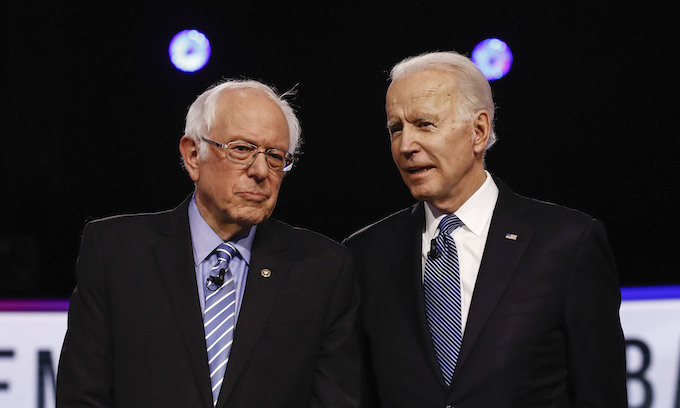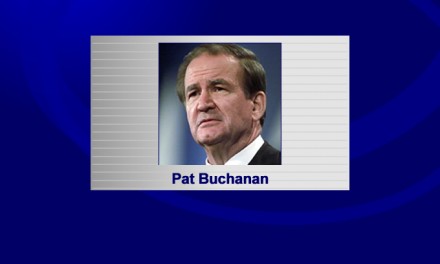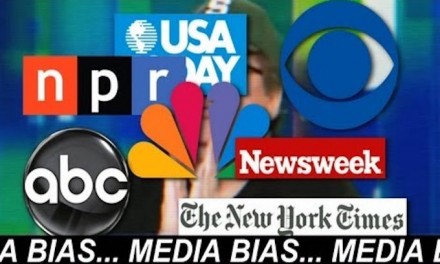“This may be Biden’s Vietnam.”
Bernie Sanders’ warning couldn’t be starker.
The campus protests that have raged for weeks feel like 1968 in miniature.
Lyndon Johnson dropped his reelection bid that year when another senator critical of the incumbent’s foreign policy — Vietnam in that case, Israel and Palestine today — proved that a substantial number of Democrats were prepared to abandon the president.
Eugene McCarthy played the role of Bernie Sanders back then.
McCarthy didn’t have a prayer of beating Johnson in the primaries, much as Sanders wasn’t up to the task of defeating Biden in 2020.
But McCarthy, like Sanders now, knew how passionately young, progressive Democrats opposed the president.
And waiting in the wings to replace McCarthy as Johnson’s challenger was a more formidable figure: Sen. Robert F. Kennedy.
Biden had no trouble fending off Kennedy’s son in this year’s primaries, but RFK Jr. remains in the presidential race as an independent.
The idiosyncratic RFK Jr. could conceivably take votes from either Biden or Donald Trump.
But it’s Biden’s coalition that’s fracturing, and any other options on the ballot threaten to soak up the protest vote.
It’s not just Kennedy the president has to worry about.
Cornel West, like RFK running as an independent, and the Green Party also give angry or disillusioned left-wing voters an alternative.
Democrats have painful memories not only of 1968 — when chaos within their party, and on streets and campuses, led to Richard Nixon’s victory — but also of 2000, when Ralph Nader’s presence on the Green ticket sapped support for Al Gore in an election that came down to a handful ballots in a Florida recount.
Whether or not Nader pulled enough votes from Gore on Election Day to cost him the White House, the consumer advocate’s campaign was bad publicity for Gore throughout that fall, spotlighting divisions on the left.
Biden can ill afford any cracks in his coalition.
When they aren’t blaming Russia for Trump’s victory over Hillary Clinton in 2016, Democrats blame that year’s Green Party nominee, Jill Stein, for subtracting a small but badly needed number of votes from Clinton’s column.
Discontent with Biden over Israel is louder than complaints about Gore in 2000 or Clinton in 2016.
Sanders says trouble isn’t limited to campuses:
“I worry very much that President Biden is putting himself in a position where he has alienated, not just young people, but a lot of the Democratic base, in terms of his views on Israel and this war,” the Vermont senator told CNN’s Christiane Amanpour.
Biden campaign national co-chairman Mitch Landrieu called the Vietnam comparison an “overexaggeration” in a CNN appearance of his own on Sunday.
But if today’s protests don’t match the scale and fury of the Vietnam era’s demonstrations, it’s also the case that Biden doesn’t have the achievements or stature that Johnson had.
Even protests a fraction of the size of those in ’68 might suffice to take down a president whose electoral coalition is built on the shaky foundations of the modern Democratic Party — which revealed in 2000 and 2016 just how vulnerable it is to even modest challenges from the left.
Of course, Republicans thought the specter of 1968 would work to Trump’s advantage four years ago, too, and they were mistaken.
The protests and riots following the death of George Floyd didn’t make voters flock to Trump in the name of rallying law and order.
Instead, the unrest simply made the Republican incumbent look weak, a leader who’d lost control of the situation.
Now it’s Biden’s turn to appear powerless to unite the country — or even his own side.
It was a Democratic president, Harry Truman, who first recognized the state of Israel in 1948.
But after 1968, the party’s left wing wholly embraced an ideology of “anti-colonialism,” which meant support for radical movements throughout the developing world — and which saw Israel not as a homeland for an oppressed minority but as an imperialist venture.
Pragmatic Democrats knew that view was politically suicidal.
Yet to root it out within institutions aligned with the party — like college campuses — would have alienated too many valuable constituencies.
The task called for courage that centrist liberals lacked.
Now President Biden reaps what Democrats have sown for half a century.
The president and his party can’t be pro-Israel and also anti-colonialist, not as long as professors and student activists define the theory and practice of anti-colonialism.
Yet to cast off anti-colonialism would mean calling into question bedrock beliefs about victimhood and oppression at home too.
There is a constituency for those beliefs, and Democrats depend on it.
The Vietnam era never really ended for the Democrats; the party only has papered over its contradictions ever since 1968.
Today’s campus protests have ripped off the wrapper, and they’re forcing on Biden a choice he can’t, or won’t, make.
Daniel McCarthy is the editor of Modern Age: A Conservative Review. To read more by Daniel McCarthy, visit www.creators.com
COPYRIGHT 2024 CREATORS.COM



















Anything that damages or discredits the U.S..
The obedient sock-puppet president Joe Barack OBiden supports and encourages.
LBJ had the common sense to read the tealeaves and drop out of the 1968 race. Whatever they are control feeding Joe to keep his brain fog from lifting, will prevent him from stepping down and the reality and necessity of his getting bug stepped on will soon materialize, like a confused Queen bee trying to lead an electoral invasion of Democrat colonies of street buzzing frog hopper Cicada locusts that appear right on time every 4 years just before Presidential elections and devour every peaceful productive political demonstration in sight, along with billions of American wasted dollars that could have been put to much better use. The 1968 Chicago Democrat Convention radical riots of the past will prove just a prelude to the 2024 out-right violent Chicago police depleted street rebellions. I’m not the only one who sees a hidden pre-planned pattern to this madness, realizing there are actual funded dark forces orchestrating our national destruction. Thanks to former Chicago Community organizer Obama, and his pet Biden Veep turned President, both in conspiracy with their Woke planted 5th columnist Judges and judicial destroyers,,, unlike the January 6th D.C. demonstrators, none who commit the violence will suffer the corrective Justice required to cut out the cancer they bring to the American body politic. Vietnam debacles being replaced by Afghanistan and Israeli betrayals should have been the first red flag warning.
Well, it WAS the dems pushing liberalism in colleges, which imo COST us the war (because they were too busy self guessing the troops on the ground, and catering to the anti-war mob), SO ITS self evident they are on the ENEMIES Side, once again here.
” When An Opppnent declares, ” I Will Not Come Over To Your Side ,” I Clamly Say, Your Child Belongs To Us Already- What Are You? You Will Pass On. Your Descendants, However, Now Stand In The New Camp, In A Short Time They Will Know Nothing Eles But This New Community.”
Adolf Hitler